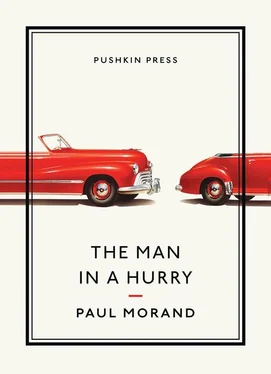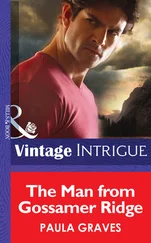Pierre looked at the door, a large, handsome door with three panels and a gleaming doorknob that only required a hand to turn it.
“I can’t just leave like that,” he thought, steeling himself. “It’s impossible.”
“What the Treaty of Versailles could have been…” Amyot was expanding.
The door appeared to open onto a magical staircase that led up a gentle slope to the street. Often, as he was falling asleep, the man in a hurry imagined a model house, a house which one would leave via gradients as speedy as toboggan runs, where a lift would transport you in your car up to the drawing room; a house from which you could send your letters and parcels straight from the window giving onto the street along spiralling chutes, as in the large stores; in which, as in the dining rooms of Ludwig II of Bavaria, the table would rise ready-laid from under the floor through a trapdoor; in which one’s clothes, by means of a system of pulleys, would dress you instantly; in which visitors, triggered by a clock, would arrive at the stated time in armchairs pulled by trolleys and would depart again on rails as soon as the most important words had been spoken, leaving the conversations recorded on wax walls.
“Always peripheral to events, our statesmen…” Amyot was still dragging on.
Monsieur de Rocheflamme, who was no longer even responding to his nephew by marriage, was now admiring his sister’s success. The three girls were talking among themselves. Pierre awoke with a start. He had been asleep. Nobody appeared to have noticed. For how long had he been asleep?
“… a more sincere outlook,” Amyot continued.
By piecing both ends of the sentence together, Pierre concluded that he had only been asleep for three words.
He now felt a great weight upon his shoulders, as overburdened as he did when he jumped out of bed on a day crammed with anxieties and meetings. And yet, five minutes earlier, he had been happy. But his familiar and demanding phantom was continuing to lead him towards the door. He absolutely had to get a breath of air.
“I’ve no more tobacco,” he said. “Would you mind if I went to buy some?”
“The tobacconist’s is a long way away,” Bonne de Boisrosé pointed out.
“We have some Virginia,” Fromentine offered.
“Do you want some Caporal?” said Monsieur de Rocheflamme.
“Forgive me. I’m used to a Turkish tobacco from the Levant. I’ll be back. It will only take a moment.”
Pierre dashed down the stairs four at a time. In the street, he took a deep breath. Hundred-year-old street lamps were making circles through the mist. The avenue was deserted, the city indifferent. Pierre took to his heels. He breathed the air deep into his lungs. Never in his life had he felt so happy. His rubberized soles held the road well, his arms flew in the air, his long, well-built legs gave him total freedom. What a pleasure the party had been! He felt no qualms about causing a disturbance in a sleeping neighbourhood where the guard dogs were all barking.
He walked past the tobacconist’s shop without going in because he had Turkish tobacco in his pocket.
He stopped, he felt better. A clock chimed ten o’clock. His swiftness had kept him sane. He felt more inclined to be polite now and he even thought that he might enjoy going back to his hosts. He retraced his steps.
“I had to go on foot. My car wouldn’t start,” he said by way of excuse. “You must think me extremely rude?”
Hedwige smiled. Pierre could see that she had not been taken in, but was grateful for the effort he had made. He rejoined the group. On seeing him, Uncle Rocheflamme rushed over.
“I’m not well established,” he said, “and you would search in vain for the name of Rocheflamme in the directory of antique dealers: it’s not there. I’m a maverick; I put independence above everything else… Look, my dear fellow, here’s something that will interest you,” he said, opening his wallet, “read this card from Waldeck-Rousseau. Yes, I had some correspondence with him. Good God, it wasn’t exactly yesterday, this was in 1901… listen.”
He read in a very loud voice: “‘I can only approve, sir, the title of your forthcoming newspaper and I wish long life to the Indépendant . Independence means setting oneself free from other people, that is to say true freedom, freedom that a subsidy from the Ministry of the Interior might compromise’… mmm… mmm… The rest is of no importance,” Monsieur de Rocheflamme muttered.
“Nice letter,” said Pierre, embarrassed.
“I’ve lots of others,” the uncle went on, having rediscovered his self-assurance. “My contemporaries have been pleased to pay tribute to my public-spirited activities as well as to my professional ones. I spent the war as pennant-bearer to General Hély d’Oissel, despite my age. But take a look at my commendation.”
He produced a folded and torn shred of paper and handed it to Pierre.
“Did you read it? ‘Proud and independent character…’’’
“That’s really nice,” said Pierre.
“One day you must come to my home and I’ll show you the pearls of my collection: I’ve got letters from the poet Edmond Rostand, from Baron Édouard de Rothschild, from the novelist Paul Hervieu and even from Rockefeller; all acknowledge my artistic ability and my natural pride; all congratulate me on never having been a slave to fashion, never tied to any one party, never dependent on anything or anyone else. Me, a servant, nay! Neither slavery, nor compromise. That’s how I am, to put it bluntly!”
“It’s unusual,” said Pierre.
“That’s the way I am. If ever we do business together…”
“The centuries divide us, alas,” Pierre replied with deference and suspicion. “You deal in the eighteenth century, whilst I…”
“I can take a step backwards, and you a step forwards. And we shall meet halfway; amid the Gothic, for example. By the way, I’ve heard of an exceptional opportunity: it’s an ivory casket…”
Pierre thought it wise to bring him down a peg.
“Stick to marquetry, it’s safer, and let me bury myself in barbarism on my own; for me, a language becomes decadent as soon as it is written down, and a Riesener chest is the ultimate in written style… Whereas a bronze from Luristan or a Mycenaean cup is a spoken legend.”
“I’ve never ever seen any!” exclaimed Fromentine. “Oh, Monsieur Niox, do show me one.”
“With pleasure,” said Pierre, relieved to be rid of the uncle. “I’ll take you to the Louvre one morning… all three of you.”
The rest of the evening was extremely pleasant as the Boisrosé girls frolicked among themselves, without resorting to any scheming or underhand approach towards the outsider, each of them with her own particular looks, her way of moving, her grace and her warmth, while the blending of voices, the entwining of gestures and the succession of these individual melodies built up into a musical drone, into an assortment of continuously picturesque colours. Angélique, argumentative, full of ready answers, her wit restrained. Fromentine, emitting wild shrieks and shaking the corkscrew out of her frizzled hair. Hedwige, enigmatic, contained, controlling them from on high.
It was midnight. The stove had been replenished several times. Pierre had settled in, unable to free himself from the spell, to quit this vanilla-flavoured empire where time did not infiltrate, and where he would have remained until dawn had Monsieur de Rocheflamme, among other idiotic remarks and Gallicisms, not spoken of “returning to his Penates”.
Pierre was the last to leave.
“The staircase is Fromentine’s handiwork,” announced Madame de Boisrosé, whose old-fashioned manner matched her brother’s.
Читать дальше












